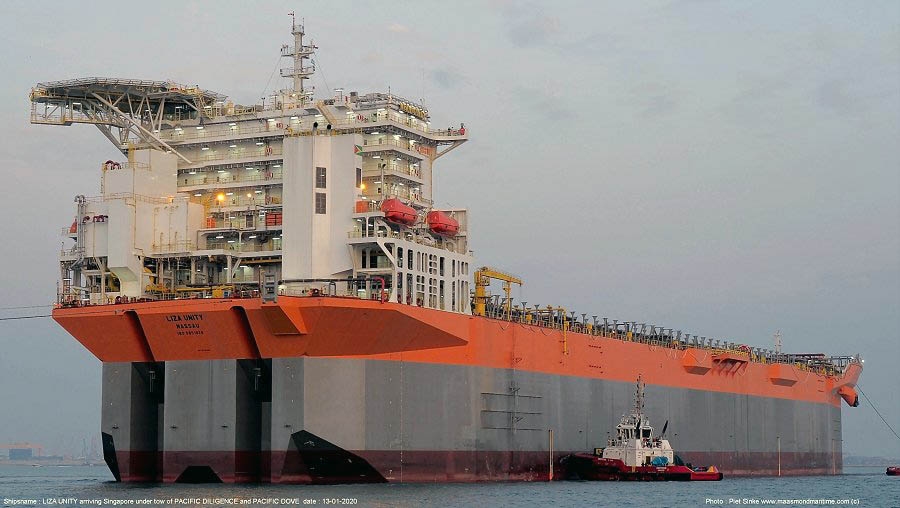Ongoing oil recovery pursuits in South America, notably in Guyana and Brazil, are key factors influencing the increased production of Floating, Production Storage and Offloading (FPSO) units, vessels used by the offshore oil & gas industry for the production and processing of hydrocarbons and for the storage of oil until it can be transferred to a tanker. Brazil and Guyana have been instrumental in the recent growth of the FPSO industry with up to ten new vessels expected to be on order this year and others lined up for production in the near future, according to industry reports.
The market for FPSO units has now almost brushed off the effects of the COVID-19 pandemic in 2021 and is likely to continue apace in 2022, according to a report by the Oslo-based energy research and business intelligence company, Rystad Energy. Two lease contracts were awarded in the fourth quarter of 2021, bringing the total for the year to 10 – up from just three in 2020 – a strong rebound for the FPSO market.
Rystad Energy stated recently that demand for FPSO units in Brazil was a significant contributing factor to the 2021 growth in overall demand with seven of last year’s 10 contract awards being Brazilian projects. Brazil is reportedly expected to receive an additional three FPSOs. The Brazilian projects are expected to be the largest in terms of production capability.
This year, oil recovery offshore Guyana is expected to contribute one FPSO to the global total, with the UK adding two projects. Meanwhile, Angola, Australia, China, and Malaysia, are forecast to each award one new FPSO contract this year.
“With around thirty (30) FPSO units under construction or queued up for construction, and another 10 expected to be awarded over the next 12 months, the market is set to build on its recent success. However, as witnessed in many other facets of the global economy in recent months, supply chain concerns linger and will test the market’s ability to take in new contracts without uncontrollable cost overruns and delays,” says Zhenying Wu, a senior analyst with Rystad Energy.
In Brazil, Yinson, one of the world’s leading FPSO contractors, has been awarded two letters of intent (LOI) from Petrobras to supply the Integrado Parque das Baleias (IPB) FPSO and for operation and maintenance services under a lease-and-operate agreement lasting 22 years and six months from the day of final acceptance. The FPSO will be deployed at the Jubarte Field in the North Campos basin and is scheduled to start production in late 2024.
ExxonMobil has also awarded an FPSO contract for the deepwater Yellowtail development in the Stabroek Block off the coast of Guyana. The FPSO will be designed to have an oil-processing capacity of 250,000 barrels of oil per day (bpd), a gas-processing capacity of 450 million cubic feet per day, and storage of up to 2 million barrels. When completed, the FPSO will be the company’s largest producing unit ever built.
Currently, ExxonMobil is producing from Stabroek via the Liza Destiny FPSO. The Liza Unity FPSO arrived in Guyanese waters on October 26, and the oil major expects both units to produce this year. When the Prosperity and Yellowtail projects come online in 2024 and 2025, respectively, ExxonMobil will then have a total processing capacity of more than 800,000 bpd in Guyana.
In Nigeria, BW Offshore has secured a lease extension for the FPSO Sendje Berge, operating for Addax Petroleum Exploration (Nigeria) Ltd, which will run through to the fourth quarter of 2022.
In Norway, Aker Solutions received an LOI for a FEED (Front-End Engineering Design) contract from Equinor to supply an FPSO to be employed at the Wisting Field in the Norwegian sector of the Barents Sea. The scope of the FEED is to provide front-end engineering design for a circular FPSO solution, which includes an option for EPCI (Engineering, Procurement, Construction and Installation – a common form of contracting arrangement within offshore construction) of the FPSO topside. If the project moves forward to the execution phase, the EPCI option potentially represents a significant contract that is estimated to be worth between US$960 million and US$1.45 billion.





